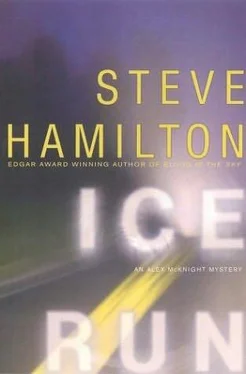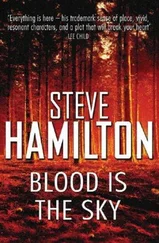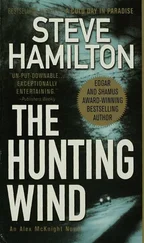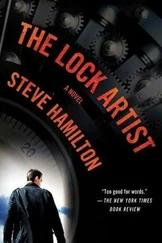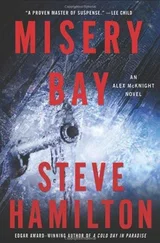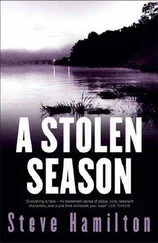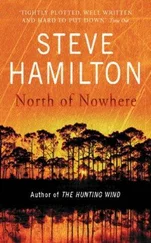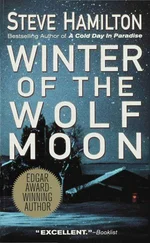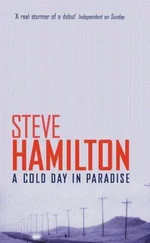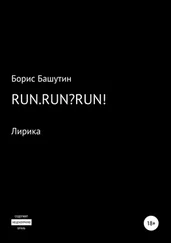Steve Hamilton - Ice Run
Здесь есть возможность читать онлайн «Steve Hamilton - Ice Run» весь текст электронной книги совершенно бесплатно (целиком полную версию без сокращений). В некоторых случаях можно слушать аудио, скачать через торрент в формате fb2 и присутствует краткое содержание. Жанр: Полицейский детектив, на английском языке. Описание произведения, (предисловие) а так же отзывы посетителей доступны на портале библиотеки ЛибКат.
- Название:Ice Run
- Автор:
- Жанр:
- Год:неизвестен
- ISBN:нет данных
- Рейтинг книги:4 / 5. Голосов: 1
-
Избранное:Добавить в избранное
- Отзывы:
-
Ваша оценка:
- 80
- 1
- 2
- 3
- 4
- 5
Ice Run: краткое содержание, описание и аннотация
Предлагаем к чтению аннотацию, описание, краткое содержание или предисловие (зависит от того, что написал сам автор книги «Ice Run»). Если вы не нашли необходимую информацию о книге — напишите в комментариях, мы постараемся отыскать её.
Ice Run — читать онлайн бесплатно полную книгу (весь текст) целиком
Ниже представлен текст книги, разбитый по страницам. Система сохранения места последней прочитанной страницы, позволяет с удобством читать онлайн бесплатно книгу «Ice Run», без необходимости каждый раз заново искать на чём Вы остановились. Поставьте закладку, и сможете в любой момент перейти на страницу, на которой закончили чтение.
Интервал:
Закладка:
I knew others would come. I’d be busy again. That was good.
The phone didn’t ring again. I plowed one more time, then I went to bed. I lay there staring at the ceiling, listening to the wind.
Someday, I thought, that’ll be me. The whole picture came into my head, all at once. I’ll sit at the Glasgow Inn all day. Maybe Jackie will be gone by then. His son will own the place. But I’ll still go down there and nobody will mind, because I won’t be bothering anybody. I’ll sit there and look out the window and think about things that happened a long time ago. Then one night I’ll go outside into the cold, cold air and they won’t find me until the next morning.
Just like Simon Grant. Frozen stiff in a pile of snow. All alone.
That’ll be me.
Chapter Six
The men from downstate arrived the next day. They must have gotten up at three in the morning to get here so early. There were four of them in two SUVs, with four identical Arctic Cat sleds on the two big trailers. I got them set up in the third cabin and stacked a quarter cord of wood by their front door. Then I went back to my cabin, split another full cord, then plowed the road again.
I cleaned my cabin within an inch of its life, throwing out food from the refrigerator and picking up old magazines and books. I finally hung those extra shelves I needed. I even cleaned the bathroom.
It kept snowing lightly all day long. I went out and plowed again, then shoveled the walkways in front of all the cabins. I knew they’d all be occupied before the week was over.
Finally, I went down to the last cabin site and knocked most of the snow off the blue tarp. I wished like hell I could get back to work rebuilding it. That’s the kind of job I could lose myself in for days at a time. But that would have to wait until springtime.
When the day was almost over, I went down to Jackie’s place. He slid a cold Canadian my way. I asked for a little something else to go with it. He poured me a shot and watched me knock it back. He didn’t say a word.
I had dinner by the fire. Vinnie LeBlanc came in and sat down next to me. His ear was still taped up and in the firelight I could see the scar on his cheek, the scar that he would carry for the rest of his life. It made me think about how he had gotten it, and how I had met this woman named Natalie up there, this policewoman from the OPP.
“You don’t look so good,” he said to me.
“What else is new?”
“Things okay with Natalie?”
“Things aren’t okay. I’m not sure they’re anything at all.”
He nodded his head. “I’m sorry, Alex.”
“It’s all right.”
Jackie brought me another beer and another shot. He stood above me like he was going to say something, but he never did. He put his hand on my shoulder for a moment, then walked away.
“I’m impressed,” I said to Vinnie. “He didn’t even say, ‘I told you so.’”
Vinnie didn’t comment on that, or on anything else. That was one of the best things about the man. He didn’t try to make small talk. We sat by the fire and I picked up the Sault Evening News and read the lead story about Simon Grant’s death. Then I turned to the obituary.
If I had read that obituary a little more carefully, I might have saved myself a hell of a lot of trouble. But I didn’t.
“I’m going back,” I said, folding up the paper. “I’ll see you later.” I tapped my fist on Vinnie’s head.
“Calling it a night?” Jackie said as I put my coat on.
“I’m going to bed,” I said, “right after I go dig out my suit. I’m going to a funeral tomorrow.”
The next day was cold. There was a bitter wind from the north, the kind of wind that blew the snow into your eyes and knifed its way through your warmest coat. The snowmobilers were up early, tearing up the trails that run along the back of my property. I could hear the whine of the engines as I got up and got dressed. I put my suit on and my gray wool overcoat, which wouldn’t be warm enough, I knew, but you can’t wear a big mackinaw coat over a suit. Not even in the Upper Peninsula.
St. Mary’s was on Portage Avenue, just a few blocks down from the Ojibway Hotel, and just a few blocks away from where Mr. Grant froze to death, for that matter. I got there around 12:30. The funeral mass would start at one o’clock. I sat in the parking lot with the engine running to stay warm, watching the people go into the church. Everyone kept their heads down against the wind and held their coats tight against their chests.
At ten after one, I got out of the truck and went into the church. It was an old building made of dark red brick, with a great black spire that was ringed on this day with a hard crust of snow all along the edges. When I got inside, everyone was standing up, reciting the Lord’s Prayer. I slipped into the back pew just as they all sat down.
There was a closed coffin up front, covered in white lilies. The priest went through the ritual, and everyone seemed to know what was coming and when to respond. It finally occurred to me that everyone else in the place had a printed program. I followed along as best as I could, until the priest finally asked who would come up and speak of Simon Grant. There was a long silence, and then one man stood up and made his way slowly to the pulpit.
He was big, well over six feet tall and pushing 250 pounds. He looked like a former offensive lineman. His necktie was strangling him. He took a few moments to compose himself, then he began to speak. “I just wanna say a few words about Pops,” he said. He went on to describe a long life filled with work and hardship. Growing up as an orphan during the Great Depression, having to act like the man of the house when he was only nine years old, going out every day to shine shoes and run errands or do whatever he could to make a little money for his family. Later joining the navy, and seeing action aboard a carrier in the Pacific. Coming back home and raising a family, working on the docks, back when the Soo Line ran all the way down to the river. Taking his kids out on the water every weekend.
“Pops loved this place so much,” the man said, “even though the winters got harder and harder for him. He never wanted to move away. He said his heart was here and he wanted to be buried here.”
The man stopped and looked down at the coffin. “You made us promise, Pops, that we’d never take you away from here. We kept that promise.”
Another man came up next, a slightly smaller version of the first. He looked a few years younger. He tried to speak but he couldn’t say a single word. His brother held on to the back of his neck and told him it was okay. He walked him back to the first pew and sat down with him.
Then a woman stood up. She walked up to the pulpit, and as soon as she turned around, I knew who she was. God damn it all, I thought, it’s the woman at the house. Chris Woolsey’s mother.
She said a few words about her father, about how he was the strongest person she’d ever known. As I listened to her, I felt a little sick to my stomach. I had gone to this woman’s house and asked to talk to her son about something that happened at the Ojibway Hotel.
The obituary in the newspaper, I thought. It probably listed her as one of the surviving children. Why hadn’t I noticed it? God damn it, I’m such an idiot.
“It’s a hard day,” she said, looking out at all the people in the pews. “But I’m glad you’re all here. Thank you.” She looked back in my direction. For one instant, it seemed like she was looking right at me. Then she sat down.
The priest conducted the rest of the funeral mass. As it drew to a close he raised his hands and gave us the blessing. I got up and slipped out the door before anyone else.
Читать дальшеИнтервал:
Закладка:
Похожие книги на «Ice Run»
Представляем Вашему вниманию похожие книги на «Ice Run» списком для выбора. Мы отобрали схожую по названию и смыслу литературу в надежде предоставить читателям больше вариантов отыскать новые, интересные, ещё непрочитанные произведения.
Обсуждение, отзывы о книге «Ice Run» и просто собственные мнения читателей. Оставьте ваши комментарии, напишите, что Вы думаете о произведении, его смысле или главных героях. Укажите что конкретно понравилось, а что нет, и почему Вы так считаете.
